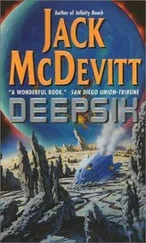“Roger. We copy.”
He signed off.
The Schramm coded its images, which were then transmitted by laserburst to the sensors of a comsat. The comsat converted the signal to radio, and broadcast to Moonbase, which handled relay to Earth. Now Ward broke that link.
He slung the canvas bag with the amplifier over his shoulder. “You want to go up?”
“Of course,” she said.
The elevator was a small hatchwire box, capable of carrying four people. It creaked as it ascended through the turret.
Ward loved the big observatories, these gleaming interfaces between humans and infinity. They were necessarily set high in remote places, where the wind blew and the stars murmured. This one, of course, was the champ.
He had become a cosmologist because astronomy seemed dull. He had never been much interested in the mechanics of stars, or the chemical properties of the planets. It didn’t matter to him that there were volcanoes on Pluto or nitrogen on Neptune. Nor did he care how the sun cooked its helium.
Give him the beginning and end of the universe. Edgar Ward on the track of the Big Bang. Yes, indeed. The Schramm was less a window on the galaxies than on creation.
They rose toward the telescope housing.
By God, this was the way to live.
Ward remembered how it had been when they’d opened the observatory. They’d invited the top people in the field to attend, but few had actually come. The shuttle flight scared most of them off. But Swifthawk had come from Kitt Peak, Yamoto from Princeton, Stevens from Hamburg, Coddie from Greenwich. Haswell and Corrigan at Fermi had received invitations, but they’d declined, thank you very much, Haswell claiming a stiff work load, Corrigan a bad back. Then they’d changed their minds and come. Ward had admired that. He’d been at Moonbase when they arrived, pale and shaken. But they’d come. And they’d endured the lunar flight to get here, where they’d all gathered in the well, and toasted the Schramm, and the future.
The elevator stopped. “Penthouse,” said Ward, opening up.
They walked out into the cage. It was a relatively narrow space about the length of an ordinary living room. Mesh panels rose not quite shoulder high on both sides. At the near end, a ladder descended to ground level.
Amy gravitated immediately toward the eyepiece. Its housing was mounted on a universal joint, and projected down from the ceiling. A padded chair had been installed for the observer. “Did they actually come up here?” she asked. “They could see the same image on the monitors downstairs, right?”
He smiled. “They loved it up here. They claimed the image was clearer, that it got distorted by electronic transmission.”
Their eyes met and they laughed.
She looked at the chair, and at him. “May I?”
“You’re in charge.”
“Yes.” She sat down, and adjusted the viewing tube. “Hard to believe.”
It was covered with dust.
“I won’t be able to see anything, will I?” She put her eye to the lens.
“I don’t think so,” he said. “Depends on the status of the amplifier.”
She looked, and shook her head. “Dark. How long will it take? After we put it in?”
“Depends how good an image you want.” The unit would collect photons over a period of time and, on signal, analyze its data base, and provide a picture. The picture would be far sharper than anything one could see through a conventional telescope. “I’d say we should have something in forty minutes.”
“I’d like to wait that long then, if you don’t mind.”
“It’s the same picture you’ll see at Moonbase.”
“Don’t care. I’d like to see it here.”
Ward decided he liked her. He nodded, gave her a thumbs up. “Then that’s the way we’ll do it.”
The cage was equipped with a series of work lamps. He turned them on. In order to get at the amplifier, he would have to remove a secondary mirror. It would be awkward, but he could handle it.
“We have coffee,” said Amy, surprised. “Would you like some?”
Ward had forgotten. They’d always kept a coffee maker and an ample supply up here. There was even a styrofoam cup dispenser and a small basin with running water which, fortunately, they had not shut off. “Yes,” he said. “If you don’t mind.”
She ladled some out of a small green tin into the coffee maker. It smelled good. One of the lamps flashed against the bottom of the container. The beam crossed the room and set a bright circle on a distant wall.
“It’ll be a few minutes.”
“Okay.”
Ward produced a screwdriver.
The mirror assembly was protected by a glass frame. He began removing screws. When he’d finished, Amy handed him his coffee. “No cream or sugar,” she said. “Sorry.”
They pulled the frame loose and set it aside. The mirror was fitted into a set of flanges.
He rotated it and lifted it out. Amy removed the spare amplifier from the canvas bag, and spread the bag out on the floor of the cage. He understood and laid the mirror cautiously on the canvas to protect it from scratches.
The amplifier was a tapered black box with lenses at both ends. He could not see any damage, but then he had not expected to. He released two springs, turned it counter-clockwise, and pulled it free.
“Lovely,” said Amy.
“We’re in good shape.” He inserted the replacement unit, fitted the flanges into the collar, and rotated it. The springs clicked. Perfect.
He handed her a remote. “Would you like to activate it?”
“Sure,” she said. “My first official act.” She aimed it and squeezed. A red lamp blinked on, and the internal computer hummed.
“We’re becoming irrelevant,” he said.
“That seems a little strong.” Her voice might have echoed through the dome. “They need us to come over and make repairs.”
Ward was seated on the floor of the cage. It wasn’t comfortable. “There might be another phase coming for us. Maybe when—if—we go to the stars. But meantime you and I will just sit around the pool.”
Her eyes fastened on him. “Not even then, Edgar. If there was ever a mission made for robots, it’s starflight.”
Ward was thinking that she was correct, and that the probability was that no one would ever really go anywhere. And the final quake hit. It rocked the cage, and pitched Amy off the arm of the chair on which she’d been balanced. For a terrifying instant, he thought the cage would break loose. He splashed coffee down his shirt front and leg. Below, a klaxon erupted. The lights flickered, and died.
“Edgar? Are you okay?” Her voice was whispery. Frightened. The shocks were still coming.
Aside from the red lamp on the amplifier, they were in total darkness. “Yes.” The klaxon continued to wail.
She moved close to him. “This is going to be a trip to remember.” She stiffened.
“I’m sorry,” he said. “It was never like this under the previous management.”
They sat in the dark and waited.
“We’ll be fine,” Ward said. “After we’re sure things have settled down, we’ll clear out.”
“Is the elevator working? Can you tell?”
“No. The lights are out.”
“How do we get down?” She almost concealed the quiver in her voice.
“There’s a ladder. We’ll be okay.”
Conversation in the dark, whatever the specific circumstances, tends to become intimate, takes on a dimension of truth that lamplight dissipates.
“So,” said Ward, feeling her proximity more intently than he had at any other time, “how do you like the Moon so far?”
Читать дальше










